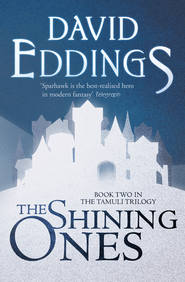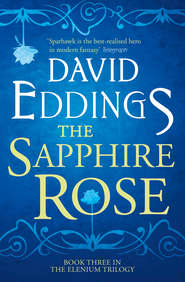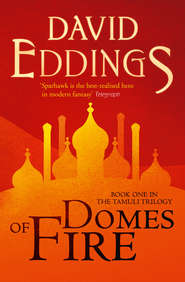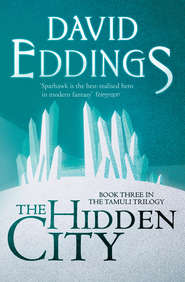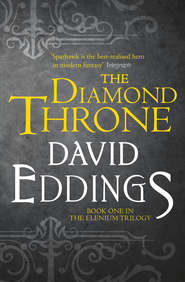По всем вопросам обращайтесь на: info@litportal.ru
(©) 2003-2025.
✖
The Complete Elenium Trilogy: The Diamond Throne, The Ruby Knight, The Sapphire Rose
Автор
Год написания книги
2018
Настройки чтения
Размер шрифта
Высота строк
Поля
‘Martel didn’t summon it,’ she replied. ‘It was sent to do his bidding by someone else.’
‘It amounts to almost the same thing then, doesn’t it?’
‘Not exactly. The Damork is only marginally under Martel’s control.’
‘But all this happened ten years ago,’ Kurik shrugged. ‘What difference does it make now?’
‘You’re missing the point, Kurik,’ she replied gravely. ‘We thought that the Damork had appeared only recently, but it was here in Cippria ten years ago, before anything we’re involved with now even began.’
‘I don’t quite follow you,’ he admitted.
Sephrenia looked at Sparhawk. ‘It’s you, dear one,’ she said in a deadly quiet voice. ‘It’s not me or Kurik or Ehlana or even Flute. The Damork attacks have all been directed at you. Be very, very careful, Sparhawk. Azash is trying to kill you.’
Chapter 19 (#ulink_a3506511-6b6d-522b-b5c6-a9be67a3821f)
Doctor Voldi was a fussy little man in his sixties. His hair was thinning on top, and he had carefully combed it forward to conceal the fact. It was quite obvious that he dyed it to hide the encroaching grey. He removed his dark cloak, and Sparhawk saw that he wore a white linen smock. He smelled of chemicals, and he had an enormous opinion of himself.
It was quite late when the little physician was ushered into the abbot’s littered study, and he was struggling without much success to cover his irritation at having been called out at that hour. ‘My Lord Abbot,’ he stiffly greeted the black-bearded churchman with a jerky little bow.
‘Ah, Voldi,’ the abbot said, rising to his feet, ‘so good of you to come.’
‘Your monk said that the matter was urgent, my Lord. May I see the patient?’
‘Not unless you’re prepared to make a very long journey, Doctor Voldi,’ Sephrenia murmured.
Voldi gave her a long, appraising look. ‘You appear not to be a Rendor, madame,’ he noted. ‘Styric, I should say, judging from your features.’
‘Your eyes are keen, Doctor.’
‘I’m sure you remember this fellow,’ the abbot said, pointing at Sparhawk.
The doctor looked blankly at the big Pandion. ‘No,’ he said, ‘I can’t say that –’ Then he frowned. ‘Don’t tell me,’ he added, absently brushing his hair forward with the palm of his hand. ‘It was about ten years ago, wasn’t it? Weren’t you the one who’d been knifed?’
‘You have a good memory, Doctor Voldi,’ Sparhawk said. ‘We don’t want to keep you out too late, so why don’t we get down to cases? We were referred to you by a physician in Borrata. He greatly respects your opinion in certain areas.’ Sparhawk quickly appraised the little fellow and decided to apply a bit of judicious flattery. ‘Of course, we’d have probably come to you anyway,’ he added. ‘Your reputation has spread far beyond the borders of Rendor.’
‘Well,’ Voldi said, preening himself slightly. Then he assumed a piously modest expression. ‘It’s gratifying to know that my efforts on behalf of the sick have received some small recognition.’
‘What we need, good doctor,’ Sephrenia interjected, ‘is your advice in treating a friend of ours who has recently been poisoned.’
‘Poisoned?’ Voldi said sharply. ‘Are you sure?’
‘The physician in Borrata was quite certain,’ she replied. ‘We described our friend’s symptoms in great detail, and he diagnosed the condition as being the effects of a rather rare Rendorish poison called –?
‘Please, madame,’ he said, holding up one hand. ‘I prefer to make my own diagnoses. Describe the symptoms to me.’
‘Of course.’ Patiently she repeated what she had told the physicians at the University of Borrata.
The little doctor paced up and down as she talked, his hands clasped behind him and his eyes on the floor. ‘I think we can rule out the falling-sickness right at the outset,’ he mused when she had finished. ‘Some other diseases, however, do result in convulsions.’ He affected a wise expression. ‘It’s the combination of the fever and sweating that’s the crucial clue,’ he lectured. ‘Your friend’s illness is not a natural disease. My colleague in Borrata was quite correct in his diagnosis. Your friend has indeed been poisoned, and I would surmise that the poison involved was Darestim. The desert nomads here in Rendor call it deathweed. It kills sheep in the same way that it kills people. The poison is very rare, since the nomads uproot every bush they come across. Does my diagnosis agree with that of my Cammorian colleague?’
‘Exactly, Doctor Voldi,’ she said admiringly.
‘Well, that’s it, then.’ He reached for his cloak. ‘I’m glad to have been of help.’
‘All right,’ Sparhawk said. ‘Now what do we do?’
‘Make arrangements for a funeral.’ Voldi shrugged.
‘What about an antidote?’
‘There isn’t any. I’m afraid your friend is doomed.’ There was an irritating smugness about the way he said it. ‘Unlike most poisons, Darestim attacks the brain instead of the blood. Once it’s ingested – poof.’ He snapped his fingers. ‘Tell me, does your friend have rich and powerful enemies? Darestim is fearfully expensive.’
‘The poisoning was politically motivated,’ Sparhawk said bleakly.
‘Ah, politics.’ Voldi laughed. ‘Those fellows have all the money, don’t they?’ He frowned then. ‘It does seem to me – He broke off, palming at his hair again. ‘Where did I hear that?’ He scratched at his head, disturbing the carefully slicked-down hair. Then he snapped his fingers again. ‘Ah yes,’ he said triumphantly, ‘I have it now. I’ve heard some rumours – only rumours, mind you – that a physician in Dabour has effected a few cures – members of the king’s family in Zand. Normally that information would have been immediately disseminated to all other physicians, but I have some suspicions about the matter. I know the fellow, and there have been some ugly stories about him circulating in medical circles for years now. There are some who maintain that his miraculous-appearing cures are the result of certain forbidden practices.’
‘Which practices?’ Sephrenia asked intently.
‘Magic, madame. What else? My friend in Dabour would immediately lose his head if word got out that he was practising witchcraft.’
‘I see,’ she said. ‘Did this rumour about a cure come to you from one single source?’
‘Oh, no,’ he replied. ‘Any number of people have told me about it. The king’s brother and several nephews fell ill. The physician from Dabour – Tanjin his name is – was summoned to the palace. He confirmed that they had all been poisoned with Darestim, and then he cured them. Out of gratitude, the king suppressed the information of exactly how the cures were effected, and he issued Tanjin a full pardon just to make sure.’ He smirked. ‘Not that the pardon is much good, mind you, since the king’s authority doesn’t go much beyond the walls of his own palace in Zand. Anyway, anyone with the slightest bit of medical knowledge knows how it was done.’ He assumed a lofty expression. ‘I wouldn’t stoop to that myself,’ he declared, ‘but Doctor Tanjin is notoriously greedy, and I imagine that the king paid him handsomely.’
‘Thank you for your assistance, Doctor Voldi,’ Sparhawk said then.
‘I’m sorry about your friend,’ Voldi said. ‘By the time you get to Dabour and back, he’ll be long since dead, I’m afraid. Darestim works rather slowly, but it’s always fatal.’
‘So’s a sword through the belly,’ Sparhawk said grimly. ‘At the very least, we’ll be able to avenge our friend.’
‘What a dreadful thought,’ Voldi shuddered. ‘Are you at all acquainted with the kind of damage a sword does to someone?’
‘Intimately,’ Sparhawk replied.
‘Oh, that’s right. You would be, wouldn’t you? Would you like to have me take a look at those old wounds of yours?’
‘Thanks all the same, Doctor. They’re quite healed now.’
‘Splendid. I’m rather proud of the way I cured those, you know. A lesser physician would have lost you. Well, I must be off now. I have a full day ahead of me tomorrow.’ He wrapped his cloak about him.
‘Thank you, Doctor Voldi,’ the abbot said. The brother at the door will escort you home again.’
‘My pleasure, my Lord Abbot. It’s been a stimulating discussion.’ Voldi bowed and left the room.
‘Pompous little ass, isn’t he?’ Kurik muttered.
‘Yes, he is,’ the abbot agreed. ‘He’s very good, though.’
‘It’s thin, Sparhawk,’ Sephrenia sighed, ‘very, very thin. All we have are rumours, and we don’t have time for wild goose chases.’







